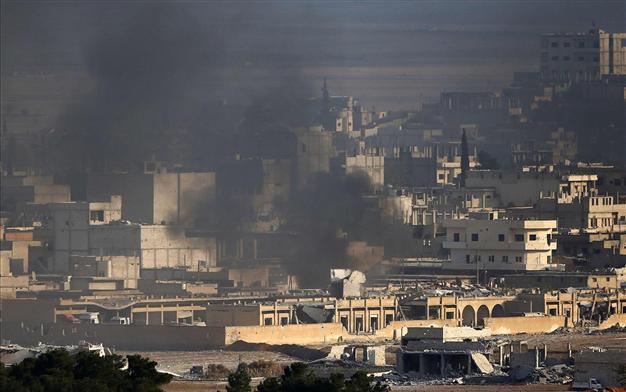Kurds’ own affairs do not concern Erdoğan, says PYD
Uğur Ergan ANKARA

The Democratic Union Party (PYD) and Turkish President Erdoğan are at odds over each other’s motives. REUTERS Photo / Yannis Behrakis
It is incomprehensible why Turkish President Recep Tayyip Erdoğan continues to meddle in the details of a security arrangement between Syrian and Iraqi Kurds given that it is an intra-Kurdish matter, Democratic Union Party (PYD) co-head Salih Muslim has said.“Mr. Erdoğan is constantly saying things. We don’t understand why an issue between Kurds concerns his,” Muslim told Hürriyet on Oct. 27, insisting that the details of the transfer of Peshmerga forces to Kobane are issues that should be dealt with only by Iraqi and Syrian Kurdish parties.
“Mr. Erdoğan wants to be the one who decides everything. But not everything is in his power,” he added.
Muslim also repeated accusations that Turkey is supporting the Islamic State of Iraq and the Levant’s (ISIL) assault on Kobane by allowing jihadists to cross its borders. Erdoğan had previously accused the Kurdish group of “scheming along the Turkish border.”
“Dear Erdoğan accuses everybody and talks about a plot, but he should first stop his own plot, the passage of ISIL through Turkey,” Muslim said. “The videos showing ISIL militants passing [to Syria] through Turkey are self-evident."
Erdoğan said the PYD had initially opposed the plans of Iraqi Kurdish Peshmerga forces’ joining the fight against ISIL for Kobane out of “fear of their scheme being disrupted.”
“The PYD does not want the Peshmerga to come,” Erdoğan said on Oct. 25. “The PYD thinks its game will be ruined with the arrival of the Peshmerga – their set-up will be spoiled.”
He also argued that the PYD is part of a “higher mind playing games along Turkey’s southern borders.”
“We need to think hard about this: There is probably a higher mind behind this set-up. I don’t think the PYD has a mentality strong enough to design it,” Erdoğan was reported as saying.
Muslim, however, dismissed these statements, criticizing Erdoğan for "meddling" in an intra-Kurdish issue.
“We have held our talks and agreed as Kurds. There is no problem with the Peshmerga coming to Kobane. They can come whenever they want. The Peshmerga will help us fight against ISIL. It won’t be as if they will come and stay in our territory,” he said.
The Turkish government views the PYD with deep suspicion because of its ties to the outlawed Kurdistan Workers’ Party (PKK) and has previously turned down requests for it to open a land corridor so that Kobane could be resupplied from other Kurdish areas of northern Syria.
Ankara insists on primarily supporting the Free Syrian Army (FSA) against ISIL in Syria, seeing it as the only “legitimate” party to negotiate with.
On Oct. 24, Erdoğan had announced that the PYD accepted the passage of 1,300 people from the FSA and said relevant teams were negotiating their route of passage.
However, contradicting Erdoğan’s remarks, Muslim said no agreement had been reached, adding that the FSA should open a second front against ISIL instead of coming to Kobane in support of the Kurdish fighters.
In his statement to Hürriyet, Muslim said he did not see any problem with the FSA coming to Kobane and claimed that the reason behind the delay in the FSA militants’ passage "could be Turkey’s objection.”
Meanwhile, Mustafa Qadir, the minister of the Peshmerga Affairs in Iraq’s autonomous Kurdistan Regional Government (KRG), said on Oct. 27 that Kurdish fighters were ready to depart for Syria to aid Kobane, but were being held up by Turkey.
“Until now, Peshmerga forces have not gone to Kobane, but we are ready to send them,” Agence France-Presse reported Qadir as saying.
“We are waiting for Turkey to clarify its stance, and because of this we have not sent any forces,” Qadir said, without elaborating on what exactly is required from Turkey for the deployment to go ahead.
















